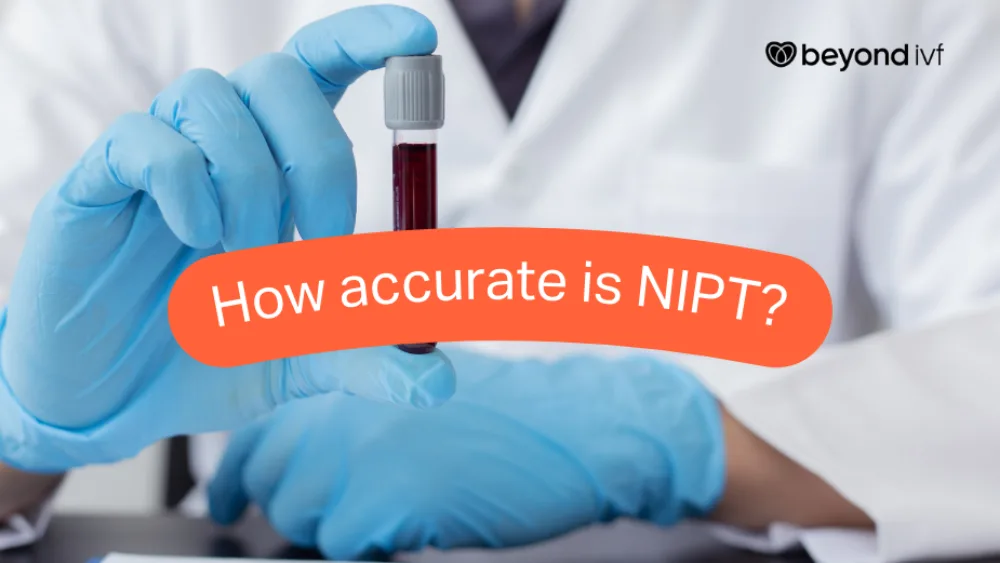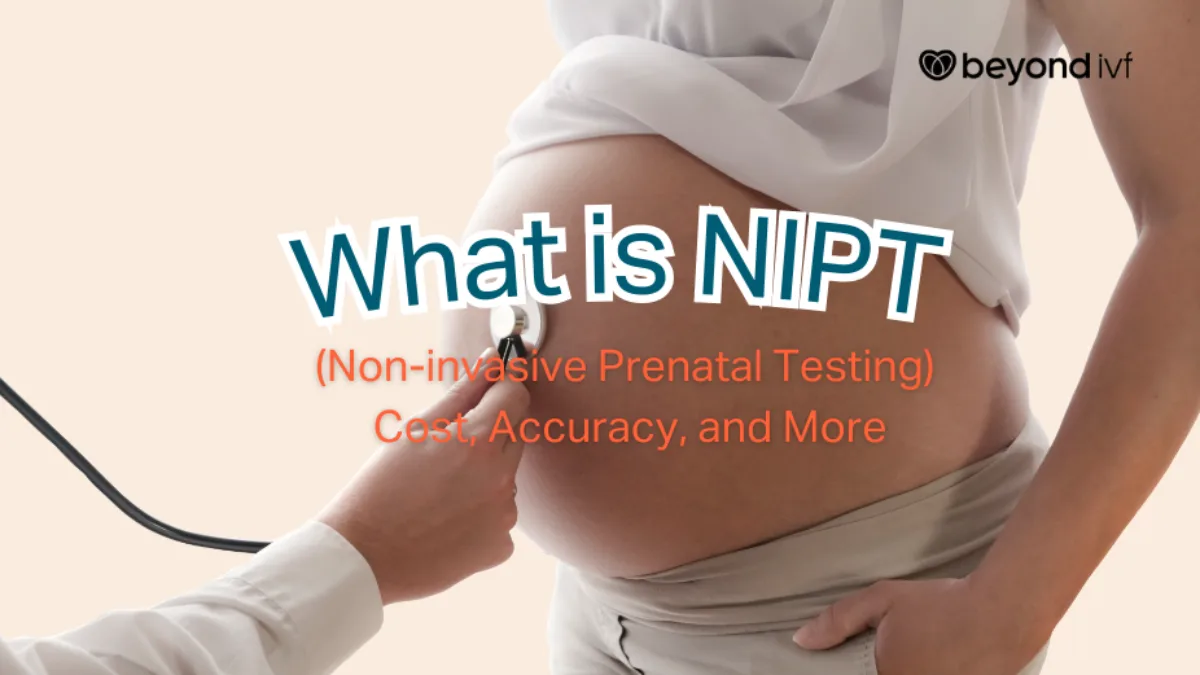Non-invasive Prenatal Testing (NIPT)
involves taking a sample of a pregnant person’s blood to screen for their baby’s risk of chromosomal abnormalities. It analyzes the baby’s DNA that is floating around their mother’s bloodstream (cell-free DNA) using massively parallel sequencing. If you are pregnant with a child with Down syndrome, an excessive amount of cell-free DNA fragments from the 21st pair of chromosomes will be found.
NIPT is highly accurate in screening for Down syndrome and has a 99% accuracy in detecting Trisomy 21, with a false positive rate of less than 1%. In comparison, other testing like nuchal translucency (NT), combined test, triple test, and quadruple test are only 60-85% accurate.

What are the benefits of NIPT?
1. Trisomy 21 (Down Syndrome)
Screens for Down syndrome (Trisomy 21), where there is an extra 21st chromosome. It is one of the most common chromosomal abnormalities. A baby with Down syndrome usually has a smaller-than-normal head, flattened face, almond-shaped eyes that slant up, flattened bridge of the nose, small ears and mouth, and protruding tongue. They may have congenital heart disease, delayed development, and low IQ.
2. Trisomy 18 (Edwards Syndrome)
Screens for Edward syndrome (Trisomy 18), where there is an extra 18th chromosome. A baby with Edward syndrome has a small head and jaw, their ears are attached lower on the head, they may have a cleft lip and/or palate, and their hands and feet may be deformed. They may have congenital heart disease, kidney problems, abnormal lungs and digestive system, and low IQ. They don’t usually live past one year.
3. Trisomy 13 (Patau Syndrome)
Screens for Patau syndrome (Trisomy 13), where there is an extra 13th chromosome. A baby with Patau syndrome usually has a cleft lip and palate, small eyes, low ears, and extra fingers and toes. They are often deaf and cognitively disabled, and only live a few weeks after birth.
The Different Types of NIPT
There are currently many brands for non-invasive prenatal testing (NIPT) in different countries around the world. The most popular brands used in most laboratories include:
- NIFTY
NIFTY is chromosomal screening that checks all pairs of chromosomes for any missing (deletions) or extra (trisomies) chromosomes as well as diseases that result from deletions or trisomies. It is the most thorough screening available, and the sample is sent to Hong Kong for testing.- Cost: 12,500-25,000 baht
- Package: Tests all 23 pairs of chromosomes and screens for 84 conditions
- Results: Takes 7-14 days to receive results
- Cost: 12,500-25,000 baht
- NGS NIPS
NGS NIPS is non-invasive prenatal screening, which means the procedure doesn’t impact the fetus and there are no miscarriage risks as there are with an amniocentesis. The sample is tested in Thailand and it is the cheapest test.- Cost: 10,00 baht
- Package: Tests all 23 chromosomes
- Results: Takes 7-10 days to receive results
- Cost: 10,00 baht
- NICE
NICE screens for chromosomal abnormalities through cell-free fetal DNA, which is DNA of the fetus that circulates in the pregnant person’s bloodstream. NICE was created as collaboration of Diagnomics in the United States and EONE in South Korea.
- Cost: 25,000 baht
- Package: Tests 8 chromosomes and screens for 8 disorders
- Results: Takes 7-10 days to receive results
- Cost: 25,000 baht
- Panorama
Panorama is genetic screening that looks for deletions or trisomies of chromosomes and can test for DiGeorge syndrome. It has a 99% accuracy in detecting Down syndrome (Trisomy 21). The sample is sent to the United States to be tested.
- Cost: 20,000 baht
- Package: Screens 5 chromosomes and tests for 5 disorders
- Results: Takes 10-14 days to receive results
- Cost: 20,000 baht
- Thai NIPT
Thai NIPT is DNA screening of the placenta and cell-free fetal DNA in the pregnant person’s bloodstream for deletions or trisomies of chromosomes, especially the 21st, 18th, and 13th chromosomes, as well as the sex chromosome, which are commonly responsible for abnormalities in the baby.
The test can be done from 10 weeks on. Thai NIPT is fast and highly accurate (more than 99%) for Trisomy 21, which causes Down syndrome. The sample is tested in Thailand.
- Cost: 12,000 baht
- Package: Screens all 23 chromosomes
- Results: Takes 7-10 days to receive results
- Cost: 12,000 baht
- G-NIPT
G-NIPT screens all 23 pairs of chromosomes for abnormalities that can have severe consequences and may be life-threatening for the fetus. A blood sample is collected from the pregnant person for this test. G-NIPT has the CPA standard from South Korea.
- Cost: Unknown
- Package: Screens all 23 chromosomes and tests for disorders (unspecified number)
- Results: Takes 5 days to receive results
- Cost: Unknown

Who might need NIPT?
- NIPT can be done whether it is a singleton or multiple pregnancy, and whether it is an IVF pregnancy or surrogacy.
- NIPT is done after 10 weeks of gestation.
- NIPT is recommended if the pregnant person is over 35 as the risk of Trisomy 21 and Down syndrome, which can cause developmental delays and heart and digestive problems in the baby, increases with the age of the pregnant person.
- NIPT is recommended if chromosomal abnormalities are suspected through ultrasound.
- NIPT is recommended if there were chromosomal abnormalities, such as trisomies, in a previous pregnancy.
- NIPT is recommended if other screenings show the fetus may have Down syndrome or other genetic abnormalities.
- NIPT is recommended if either parent has a Robertsonian translocation (where a certain type of chromosome attaches to another), increasing the risk of Trisomy 13 and 21.
When is NIPT performed during pregnancy?
- NIPT cannot be done before 10 weeks of gestation because there is not enough fetal DNA for testing.
- NIPT can be done between 10-16 weeks of gestation and this is when it is usually done.
- NIPT can be done between 16-20 weeks, but should be done sooner rather than later.
- Between 20-30 weeks, only a few laboratories can do the NIPT, but it is not recommended at this point as there is nothing that can be done. Results only provide information.
- NIPT cannot be done after 30 weeks of gestation.
NIPT can be done in all pregnancies at 10-24 weeks of gestation, but is recommended at 10-16 weeks.
When is NIPT performed during pregnancy?
The NIPT Procedure: How is it done?
- The nurse will take a preliminary medical history.
- Weight and blood pressure will be checked and then the pregnant person will see the doctor.
- The doctor will take a thorough health history, including existing medical conditions, antibiotic use, history of chromosomal abnormalities, and family history of disease.
- Blood will be drawn and sent for NIPT.
- Results can take up to 10-14 days.
The Results of NIPT
- Low risk means the fetus has low risk of abnormalities of the 21st, 18th, and 13th chromosomes.
- High risk means the fetus has a high risk of abnormalities of the 21st, 18th, and 13th chromosomes and further testing is recommended, such as amniocentesis.
- No result, which is rare, occurs when there isn’t enough fetal DNA for testing. More blood may need to be collected for further testing.

How accurate is NIPT?
NIPT is considered a highly accurate screening tool for Down syndrome, Patau’s syndrome, and Edward syndrome, with 99% accuracy. It has a low false-positive rate in comparison with nuchal translucency screening or serum screening, where the pregnant person’s hormones are analyzed.
How much does NIPT cost?
At Beyond IVF the NIPT costs 22,500 baht and screens for the following abnormalities:
- Down syndrome (Trisomy 21)
- Edward syndrome (Trisomy 18)
- Patau’s syndrome (Trisomy 13)
- Abnormalities of the sex chromosomes of the fetus
- Abnormalities caused by chromosomal deletions
- Abnormalities in the other 19 pairs of chromosomes
Frequently Asked Questions
Does NIPT show the baby’s gender?
The NIPT is 99.9% accurate in detecting the fetus’s sex so not only will you receive results regarding risk of chromosomal abnormalities, you will also know your baby’s sex.
How long does it take to get the NIPT result?
The NIPT involves taking a blood sample and testing it in the laboratory for chromosomal abnormalities. Results take 10-14 days.
Conclusion
Non-invasive prenatal testing (NIPT) is a chromosomal screening of the fetus that is done using the pregnant person’s blood sample. It is a simple procedure and is recommended between 10-24 weeks of gestation. Results take 10-14 days.
If you are newly pregnant and have any concerns or questions about the health of your fetus, please come by to consult with our doctor for NIPT when appropriate. If you are unable to travel to our clinic, please contact Beyond IVF on Line at @beyondivf.






